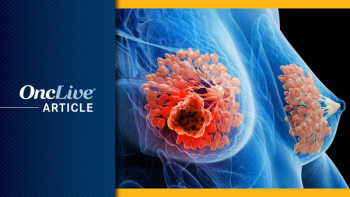
Future Treatments for Triple-Negative Breast Cancer
For High-Definition, Click
There are many opportunities for therapeutic targets in treating triple-negative breast cancer (TNBC), says Lee Schwartzberg, MD. Antibody-drug conjugates (ADCs) have demonstrated promise as treatments for patients with HER2-positive breast cancer, and a similar approach could be beneficial for TNBC. Kim Blackwell, MD, states that she looks forward to data regarding the efficacy of an experimental ADC by Celldex, glembatumumab vedotin (CDX-011), to gain a better understanding about this strategy’s efficacy in TNBC.
In the phase II EMERGE study, patients with TNBC that overexpressed gpNMB experienced an objective response rate (ORR) of 33% with glembatumumab vedotin versus an ORR of 0% with standard chemotherapy. The median overall survival with glembatumumab vedotin was 10 months compared with 5.5 months with chemotherapy (P = .003). Progression-free survival was doubled in the glembatumumab vedotin arm (3 vs 1.5 months; P = .008).
Blackwell also expresses interest in learning results from the potentially standard-of-care-changing tnAcity trial, which is looking a nab-paclitaxel combined with either gemcitabine or carboplatin versus gemcitabine and carboplatin combined as first-line treatment in metastatic triple-negative breast cancer.
Additionally, other potential therapies for TNBC are in development, including inhibitors of PARP, JAK, PLCg1, and PD-1. At the 2014 SABCS, the early-phase KEYNOTE-012 trial showed that treatment with PD-1 pembrolizumab demonstrated an ORR of 18.5% in patients with PD-L1-positive TNBC. Additionally, at the 2015 AACR Annual Meeting, the PD-L1 inhibitor MPDL3280A demonstrated a 19% ORR with 75% of responses ongoing in pretreated patients with metastatic TNBC.




































